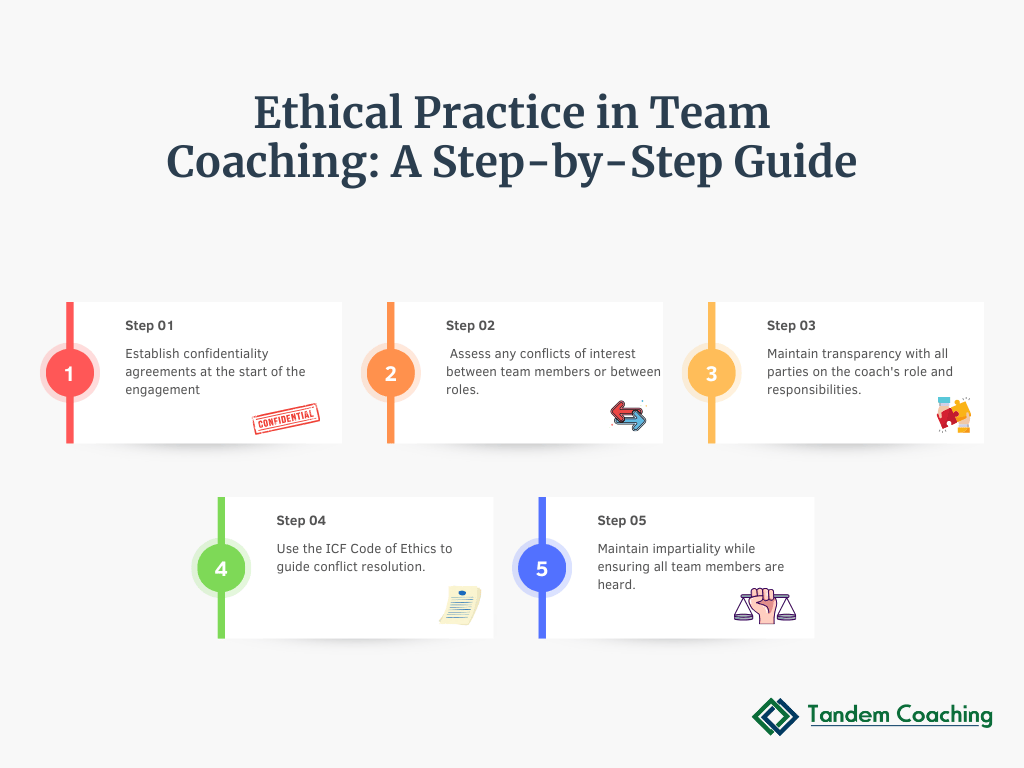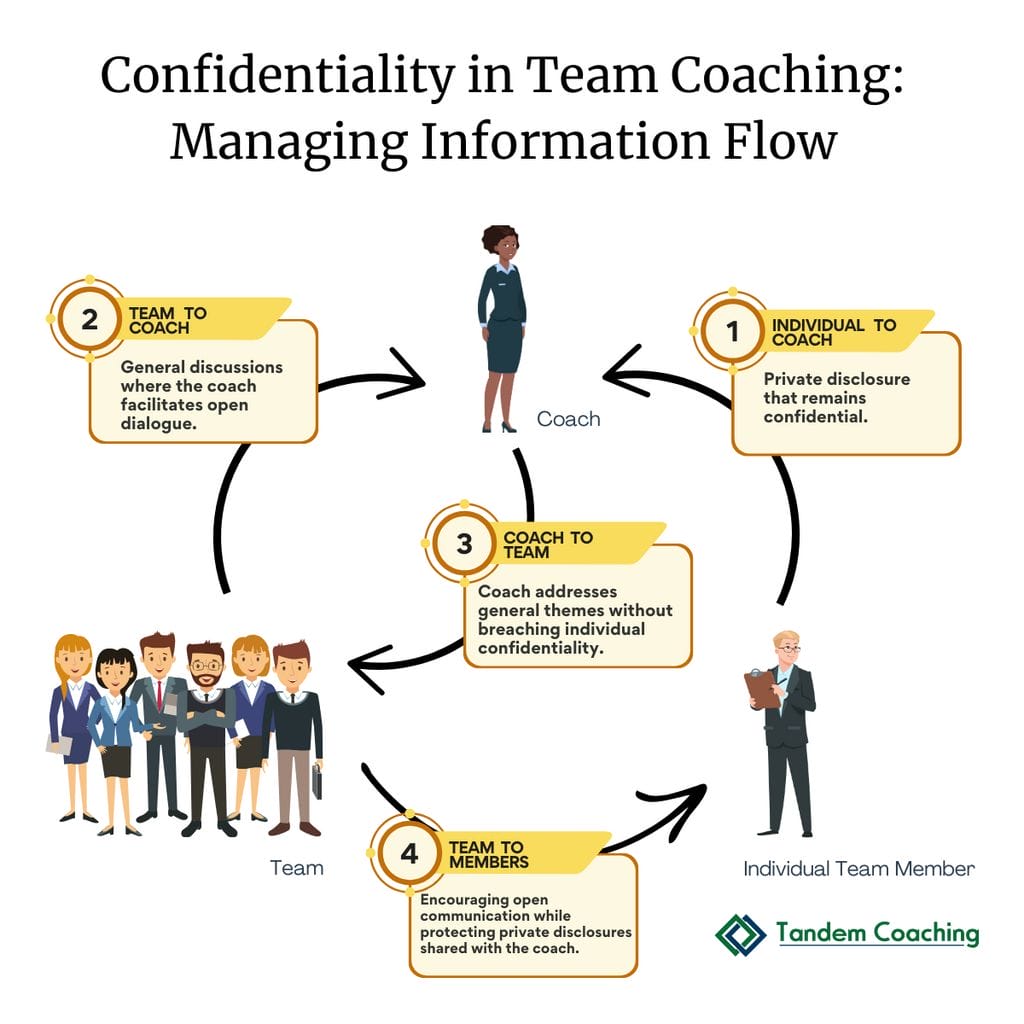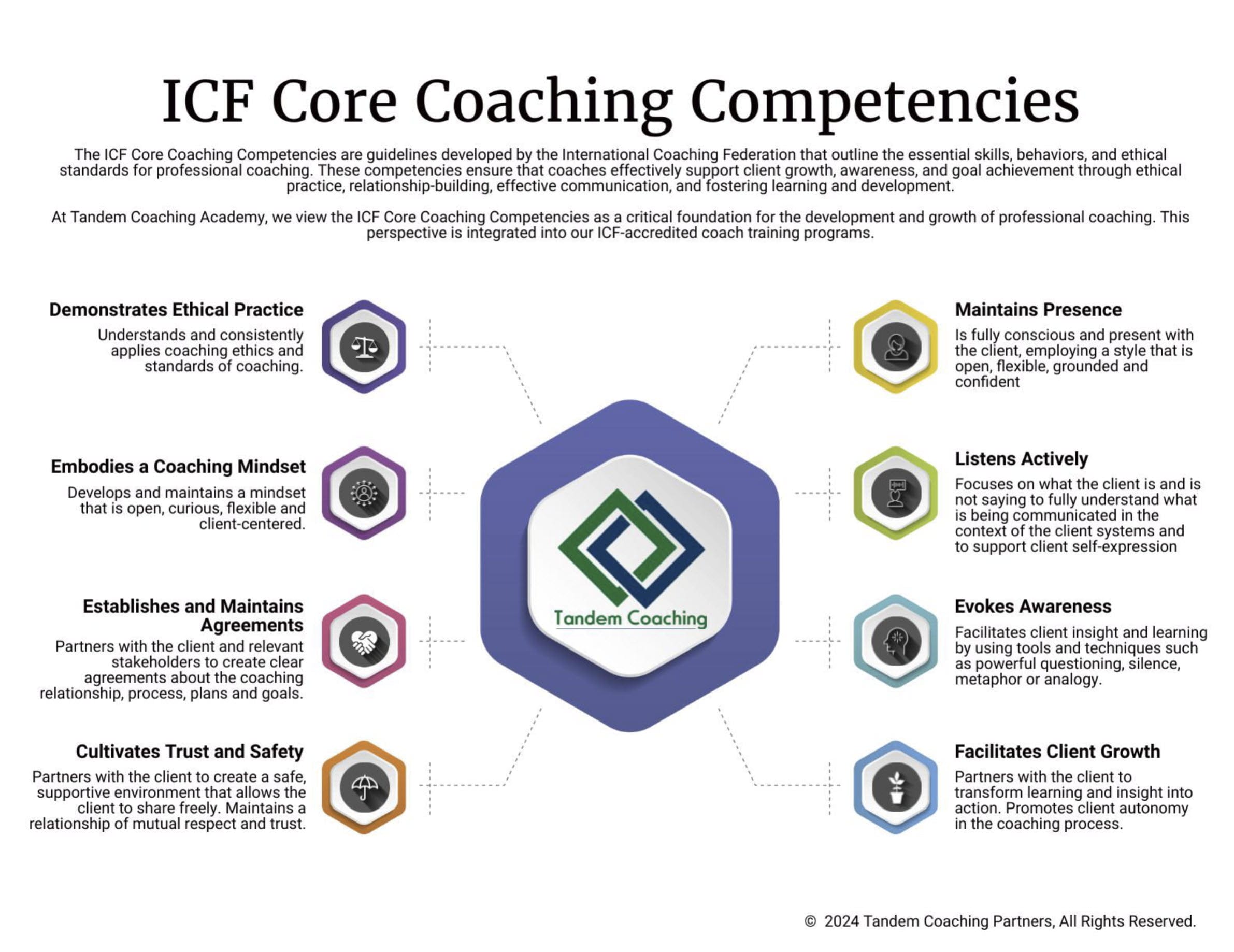Ethical practice is the backbone of any successful coaching relationship, but it takes on a new layer of complexity when applied to team coaching. As a coach, you’re not just working with individuals; you’re managing the dynamics of an entire group, navigating confidentiality, and balancing diverse interests. In this article, we will explore ICF Team Coaching Competencies: Demonstrating Ethical Practice, offering insights into what it means to maintain integrity and uphold ethical standards in team environments. You’ll learn how to handle the unique challenges of team coaching, from maintaining confidentiality to establishing clear boundaries between coaching and other modalities. Whether you’re an experienced coach aiming for your Advanced Certification in Team Coaching (ACTC) or just beginning your journey, understanding these ethical principles is key to building trust and fostering high-performing teams. Stay with us as we break down the key elements of ethical practice and provide real-world applications to enhance your coaching effectiveness.
TL;DR: This article covers the essential aspects of demonstrating ethical practice in team coaching, specifically within the framework of ICF Team Coaching Competencies. It explains how coaches can manage confidentiality, balance team dynamics, and uphold professional boundaries. We also explore the unique challenges of coaching teams versus individuals and offer real-world examples to guide ethical decision-making. If you’re working toward your Advanced Certification in Team Coaching (ACTC), this guide will provide the insights you need to meet ICF’s ethical standards.
Essential Takeaways: Navigating Ethics in Team Coaching
Ethics at the Core: The ICF Team Coaching Competencies emphasize ethical practice as the foundation for building trust and fostering effective team dynamics.
Confidentiality Management: Coaches must skillfully balance confidentiality with transparency to protect individual disclosures while guiding team progress.
Conflict of Interest: Establishing clear boundaries and roles is critical to avoid conflicts of interest, especially when coaches hold multiple responsibilities.
Power Dynamics: Ethical coaching requires actively addressing power imbalances, ensuring every team member’s voice is heard.
Real-World Application: Applying ICF’s ethical guidelines helps navigate complex team situations, from confidential disclosures to role conflicts.

Discover ICF PCC and ICF ACTC Team Coaching Competencies and Mastery
Are you eager to magnify the impact of your coaching practice?
Our ICF Team Competencies program offers a seamless transition for those who have mastered the core competencies, allowing you to delve deeper into the complexities and rewards of team coaching.
Explore this opportunity today.
Introduction to Team Coaching Competencies
Team coaching is one of the most dynamic and rewarding areas of the coaching profession. As organizations increasingly recognize the value of high-performing teams, the need for skilled team coaches continues to grow. The ICF Team Coaching Competencies provide a structured framework to guide coaches in fostering strong, cohesive teams. These competencies not only set the standard for coaching teams but also align with the broader ICF Core Competencies, ensuring that coaches maintain ethical and professional standards.
In this section, we will explore the foundational principles behind team coaching competencies and why they are essential for both experienced and aspiring team coaches. The ethical principles are at the heart of this practice, creating the foundation for a trusting, transparent, and productive coaching environment. We will also delve into how team coaching is distinct from individual coaching and why this distinction matters.
“Team coaching isn’t just about improving individual performance—it’s about unlocking the potential of the collective.”
For those pursuing their Advanced Certification in Team Coaching (ACTC), mastering these competencies is essential. Whether you’re working in a corporate, nonprofit, or government setting, the principles behind team coaching will help you guide teams to sustained success.
Ethical Practice in Team Coaching
Ethical practice is the foundation of all coaching engagements, but it becomes particularly critical in the context of team coaching. When working with multiple individuals in a team, coaches must navigate the complexity of confidentiality, power dynamics, and the diverse needs of the group. At the heart of ICF’s Ethical Standards is the principle of doing no harm and acting with integrity in every interaction.
In team coaching, coaches are tasked with maintaining confidentiality, not just for individual members but for the entire team as a unit. This involves setting clear agreements from the beginning about what information will remain private, how it will be shared, and under what circumstances it might be disclosed. Coaches must also balance the needs of the individual with those of the team, ensuring that each voice is heard while keeping the overall team goals in focus.

One example is the ICF Code of Ethics, which outlines specific guidelines for maintaining confidentiality and managing potential conflicts of interest in team coaching settings. For instance, a coach may need to address situations where team members have competing interests or where the coach holds multiple roles, such as consultant or facilitator. Navigating these complexities requires clear communication and a deep commitment to ethical practice.
When considering your journey to ACTC certification, it’s vital to fully understand these ethical challenges and how to address them effectively. Tandem Coaching Partners offers comprehensive training that focuses on these key ethical principles, helping coaches build trust and foster positive team dynamics.
Similarities and Differences Between Team and Individual Coaching Ethics
While both individual and team coaching share a foundation in ethical practice, there are key differences in how these principles are applied. Both require maintaining confidentiality, acting with integrity, and ensuring transparency. However, in team coaching, these ethical principles are applied to the group as a whole, making it necessary to balance the needs of the individual with the objectives of the team.
In individual coaching, the coach focuses on the development of one person, while in team coaching, the coach must facilitate group dynamics. Ethical challenges in team coaching can include managing interpersonal conflicts within the team, balancing confidentiality for each member, and maintaining objectivity when team members have competing goals.
A common ethical dilemma is whether to disclose confidential information shared by one team member when it affects the team’s progress. Coaches need to clearly establish confidentiality agreements at the start of the engagement to address such scenarios.
For example, a coach working with a nonprofit team might encounter a situation where one team member confides in the coach about a potential conflict with the team leader. The coach must navigate the ethical implications of this disclosure while ensuring the team as a whole can still function effectively. For more on ethical guidelines, Tandem’s ethical coaching practices page offers additional resources.
“Balancing individual confidentiality with team transparency is one of the most challenging aspects of team coaching ethics.”
Practical Applications of Ethical Practice in Team Coaching
Applying ethical principles in real-life team coaching engagements requires skill and careful planning. Coaches must establish clear boundaries, particularly when they also serve in other roles, such as facilitator or consultant. This distinction is vital for maintaining transparency and trust within the team.

One practical application is the use of confidentiality agreements, which should be established at the start of any team coaching engagement. These agreements outline the expectations for information sharing and ensure that all team members are aware of how their data will be handled.
For instance, a team coach working in a corporate environment might deal with sensitive information related to team performance or interpersonal dynamics. The coach needs to manage this information ethically, ensuring that it is used solely for the purpose of improving team cohesion and performance. At the same time, the coach must remain transparent about what information can and cannot be shared with the team as a whole.
Tandem Coaching’s Advanced Certification in Team Coaching program offers practical tools and frameworks to help coaches navigate these ethical challenges, equipping them with the skills to manage team dynamics while maintaining ethical integrity.
Ethical Practice and Team Dynamics
Ethics in team coaching goes beyond simply adhering to confidentiality and integrity principles. It’s about understanding how the dynamics within a team can complicate these standards. Team coaches need to be acutely aware of group interactions, ensuring that the ethics of confidentiality, transparency, and fairness are upheld while navigating complex team relationships.
For example, team members often have different perspectives, experiences, and agendas, which can create conflicts. A coach must not only mediate these differences but also ensure that they do so without breaching confidentiality or taking sides. It’s about maintaining an ethical presence while facilitating discussions and ensuring that all voices are heard.
A common scenario is dealing with team power imbalances. If a coach notices that one or more team members dominate discussions, they must ethically intervene to create a space where everyone can contribute without fear of reprisal. The ICF Code of Ethics offers valuable guidance on maintaining fairness and objectivity in these situations, ensuring the team’s collective goals are prioritized.
Ethical challenges can also arise when the coach holds multiple roles, such as acting as a consultant or facilitator alongside their coaching duties. Here, clear boundaries must be established to avoid conflicts of interest and maintain trust. Tandem’s ICF Core Competencies page provides useful insights into balancing these roles ethically within a coaching engagement.
“Team coaching requires an ethical approach that respects individual needs while prioritizing the team’s collective goals.”
ICF’s Code of Ethics in Team Coaching Contexts
The ICF Code of Ethics is the guiding document for coaches worldwide, but its application in team coaching has specific nuances. In team coaching, the coach is responsible not just for the well-being of individual members but also for the team’s overall health. This unique responsibility means that ethical principles must be applied with a broader perspective in mind.
For instance, the ICF Code mandates that coaches maintain confidentiality. But what happens when one team member shares information that could benefit the entire group if disclosed? The coach must navigate this dilemma carefully, ensuring they uphold confidentiality while considering the team’s broader development goals. According to the ICF Code of Ethics, confidentiality agreements established early in the coaching relationship are crucial for avoiding these ethical gray areas.
Another critical aspect is handling conflicts of interest. In team coaching, coaches may work closely with both team members and their leaders, which can lead to situations where they are privy to information from both sides. In these cases, it’s important to maintain impartiality and ensure that any potential conflicts are addressed transparently from the outset.
“Navigating ethical dilemmas in team coaching requires a firm grounding in the ICF Code of Ethics, alongside a clear understanding of team dynamics and individual confidentiality.”

Discover ICF PCC and ICF ACTC Team Coaching Competencies and Mastery
Are you eager to magnify the impact of your coaching practice?
Our ICF Team Competencies program offers a seamless transition for those who have mastered the core competencies, allowing you to delve deeper into the complexities and rewards of team coaching.
Explore this opportunity today.
Case Studies in Ethical Team Coaching
1. Confidential Disclosure Versus Team Dynamics
A coach working with a nonprofit leadership team encountered a dilemma when a team member privately shared serious concerns about the executive director’s leadership. This information, if shared, could benefit the team by addressing unspoken tensions, but it would also breach confidentiality. Following the ICF Code of Ethics, the coach maintained confidentiality, choosing to address the issue indirectly. The coach guided the team through discussions focused on leadership effectiveness and communication, allowing the concerns to surface naturally without disclosing the private conversation. This approach protected individual confidentiality while fostering healthier team dynamics.
“Ethical practice means sometimes holding back key information to ensure trust remains intact. The team coach’s job is to facilitate open dialogue without compromising individual confidentiality.”
2. Role Conflict: Consultant and Coach
In a corporate setting, a coach was hired to provide both consulting and team coaching services. As discussions around company strategy progressed, the coach noticed that their input as a consultant was shaping the team’s decisions, creating a potential conflict of interest. To resolve this, the coach applied ICF ethical guidelines by clearly distinguishing between their consulting and coaching roles. The coach transparently explained their responsibilities in each role and ensured that any consulting advice was kept separate from the coaching process, allowing the team to develop its own strategies. This distinction helped restore trust and reinforced the team’s autonomy.
3. Power Imbalances in the Team
A coach working with a senior leadership team in a government agency faced an issue where senior members dominated discussions, leaving junior members feeling marginalized. The coach, adhering to the ICF Code of Ethics, created a set of ground rules to ensure equal participation from all team members. The coach facilitated structured conversations, giving junior members the opportunity to voice their perspectives while encouraging senior leaders to practice active listening. This intervention helped balance power dynamics and fostered a more inclusive team environment, demonstrating how ethical principles can guide team dynamics.
“Creating an ethical and fair environment means addressing power dynamics head-on and ensuring every voice is heard, regardless of seniority.”
4. Conflicting Team Goals
In a multinational company, the coach faced a situation where different departments within the team had conflicting goals that threatened the overall project. The marketing department pushed for a customer-first approach, while the operations team prioritized efficiency. The coach used the ICF conflict management guidelines to help the team identify their shared objectives. By guiding discussions on the broader company vision, the coach helped align the departments’ goals without forcing compromises that would hurt individual teams. The result was a unified team that respected each department’s contribution while working towards a collective outcome.
Preparing for ICF ACTC: Ethical Practice in Focus
Pursuing the Advanced Certification in Team Coaching (ACTC) requires a deep understanding of ICF’s ethical guidelines. As part of the certification process, coaches must demonstrate competency in fostering team dynamics and effectively managing the ethical challenges that arise during team coaching sessions. These include balancing confidentiality with team transparency, managing conflicts of interest, and maintaining fairness in power dynamics. The certification also evaluates how coaches apply these ethical principles in real-life coaching situations, ensuring that they are prepared to navigate complex team environments.
For coaches preparing for their ACTC, it’s crucial to develop a strong foundation in ethical practices. Tandem Coaching Partners provides comprehensive support for coaches, ensuring they are well-prepared to meet these ethical standards. You can learn more about the certification process here.
ICF’s Code of Ethics in Team Coaching Contexts
The ICF Code of Ethics serves as a compass for coaches, particularly when dealing with complex team dynamics. In a team coaching context, ethical challenges can arise when balancing the confidentiality of individuals with the needs of the group. For example, what if one member shares sensitive information that could benefit the team? Coaches must carefully navigate such dilemmas while adhering to the ICF’s strict confidentiality standards.
Another ethical consideration is the potential for conflicts of interest. In team coaching, a coach may work closely with both team leaders and members, making it essential to maintain neutrality. A clear coaching agreement that establishes boundaries is crucial in avoiding any perception of favoritism or bias.
For instance, when a coach works with a leadership team and an internal HR department, there can be competing expectations about the coach’s role. To navigate this, coaches must refer back to the ICF Code of Ethics, specifically on transparency and the responsibility to practice impartiality, ensuring all parties are aware of the coach’s neutral stance and that conflicts are addressed upfront.
“Effective team coaching requires more than just facilitating discussions—it demands that coaches maintain a strict ethical framework to protect both individuals and the team as a whole.”
Conclusion
As we have explored, ethical practice is fundamental to effective team coaching. The ICF Team Coaching Competencies not only provide a solid framework for fostering team dynamics but also emphasize the importance of ethical standards such as confidentiality, transparency, and impartiality. Coaches are tasked with navigating complex dilemmas that often involve balancing individual needs with the collective goals of the team. By adhering to the ICF Code of Ethics, coaches ensure that their work fosters trust, promotes fairness, and upholds professional integrity.
For those pursuing the Advanced Certification in Team Coaching (ACTC), mastering these ethical competencies is essential. It’s not just about knowing the right thing to do—it’s about applying these ethical principles consistently across diverse team environments. Tandem Coaching Partners offers comprehensive training programs that focus on these competencies, ensuring that coaches are equipped to navigate the ethical challenges unique to team coaching. Learn more about these programs here.
“Ethics in team coaching isn’t just a requirement—it’s the foundation upon which successful coaching relationships are built, ensuring trust and progress for both individuals and the collective.”
Frequently Asked Questions about Ethical Practice in Team Coaching
What is the ICF Team Coaching Competency for demonstrating ethical practice?
The ICF Team Coaching Competency for ethical practice focuses on applying coaching ethics and maintaining integrity throughout team coaching engagements. Coaches must respect confidentiality, remain impartial, and avoid conflicts of interest. Ethical practices ensure trust between the coach and team, aligning the coaching process with the ICF Code of Ethics.
For more, explore the ICF Code of Ethics.
How do I handle confidentiality in team coaching?
Confidentiality is crucial in team coaching, but it can be complex. Coaches must establish clear agreements at the outset, outlining how individual disclosures will be managed. If a team member shares sensitive information, the coach must ensure it is not disclosed to the group unless agreed upon. Learn more about confidentiality in coaching.
What ethical challenges do team coaches face?
Team coaches often deal with conflicts of interest, power imbalances, and maintaining confidentiality across a diverse group. Coaches must also avoid favoritism and remain transparent when managing team dynamics. Following ICF ethical guidelines ensures that these challenges are addressed effectively while maintaining the team’s trust.
How does ethical practice in team coaching differ from individual coaching?
While both require confidentiality, transparency, and integrity, team coaching involves managing group dynamics and balancing individual needs with team goals. Ethical dilemmas often arise from conflicts of interest and managing multiple relationships, such as between team members and leaders. Coaches must maintain impartiality across these relationships. Read more in our article on ICF core competencies.
What are common conflicts of interest in team coaching?
Conflicts of interest in team coaching can arise when the coach holds multiple roles (e.g., consultant and coach) or when they work closely with both team leaders and members. To avoid bias, the coach must maintain transparency, establish clear boundaries, and ensure impartiality from the outset.
How can a coach address power imbalances within a team?
Coaches can address power imbalances by creating ground rules that promote equal participation, encouraging quieter members to contribute, and managing dominant voices. Maintaining impartiality is key, and the ICF Code of Ethics provides guidelines on fostering inclusive environments where every voice is heard
Why is ethical practice essential for ACTC certification?
Ethical practice is a core requirement for Advanced Certification in Team Coaching (ACTC). Coaches must demonstrate their ability to navigate confidentiality, conflicts of interest, and power dynamics while adhering to ICF’s ethical guidelines. Certification ensures that coaches maintain high ethical standards across diverse team environments.
Can a coach share confidential information if it benefits the team?
No, unless it has been agreed upon in the coaching agreement. Coaches must protect individual confidentiality at all times. If sensitive information shared by a team member could benefit the team, the coach should guide the group toward similar insights without breaching confidentiality.
How do I ensure ethical practice while facilitating team conflict?
When facilitating conflict within a team, coaches should stay neutral, avoid taking sides, and adhere to established coaching agreements. Coaches should promote transparency and encourage open, respectful communication between team members, while following the ICF Code of Ethics for conflict management.
How can I pursue ethical practice training in team coaching?
Training programs like those offered by Tandem Coaching Partners include a focus on ethical practice in team coaching, preparing coaches to handle complex dynamics and ethical challenges. Check out their ACTC certification program for more information.

Unlock Your Coaching Potential with Tandem!
Dive into the essence of effective coaching with our exclusive brochure, meticulously crafted to help you master the ICF Core Coaching Competencies.
"*" indicates required fields
About the Author
Cherie Silas, MCC
She has over 20 years of experience as a corporate leader and uses that background to partner with business executives and their leadership teams to identify and solve their most challenging people, process, and business problems in measurable ways.












